
I. The IAIP’s last commissioner
“I felt threatened. They sent the deputy commissioner to tell me to prepare because they were going to throw me in jail,” said the former commissioner of the Institute for Access to Public Information (IAIP for the Spanish acronym), Liduvina Escobar, from a country on the continent where she is in the process of seeking asylum with her children, ages four and 11, and her husband.
Escobar left El Salvador on May 4, 2021, two days after receiving that warning, and three days after the Legislative Assembly controlled by the party in power disbanded the Supreme Court’s Constitutional Chamber and the Attorney General’s Office. She was temporarily relieved of duty on April 23, 2021, after she granted an interview in which she denounced irregularities regarding access to public information. The government accused her of leaking confidential information to the press from her position as guarantor of the release of public data. President Nayib Bukele finalized her definitive removal from the position on February 7, 2022.
The former commissioner left El Salvador because she felt that the system didn’t give her security or legal guarantees as a citizen. Two complaints filed against her in the Prosecutor’s Office made her speed up her decision. And she’s not the only one. Eleven lawyers, three human rights defenders, three politicians, a technologist, six former prosecutors, three journalists, businessmen, a doctor, five former officials, former employees of the Supreme Court of Justice (CSJ for the Spanish acronym) and former municipal workers left El Salvador because of feeling vulnerable after receiving threats, being followed by security forces or due to feeling at risk in light of the lack of constitutional guarantees. There are at least 50 Salvadorans who have left the country due to political persecution in the last year, according to a count by members of civil society.
In several of the cases, it has been gang members who have made the threats, mostly to former officials, according to Rina Montti, director of human rights monitoring for Cristosal, an organization that records cases of forced displacement. Cristosal alone counted 30 political exiles up to November 2021.
“There is an issue of social violence where gangs are instrumentalized and recruited or hired to make these types of threats. The reasons for the attack aren’t always linked to an issue of extortion or the operation of gangs in the area,” said Montti.
Men taking photos, slashed vehicle tires, threats from gang members, fiscal persecution through audits by the Ministry of Finance, cyber harassment with direct threats, complaints filed with the Attorney General’s Office, and police or military agents outside their homes are some of the situations that triggered an alert that led this group of Salvadorans to decide to leave their country.
They all have something in common: They became political opponents, either because they held important positions in non-governmental organizations that point out irregularities in the Bukele government, because they knew about cases of corruption in depth or because they expressed their discontent with a state policy. All, in some way, voiced criticism against the party in power.
Escobar has compiled a log of events that alerted her to make her departure from El Salvador: the four tires of her vehicle were punctured with a screwdriver, police and military patrol vehicles frequently parked outside her house, and she always suspected that her cell phone was tapped by the government.
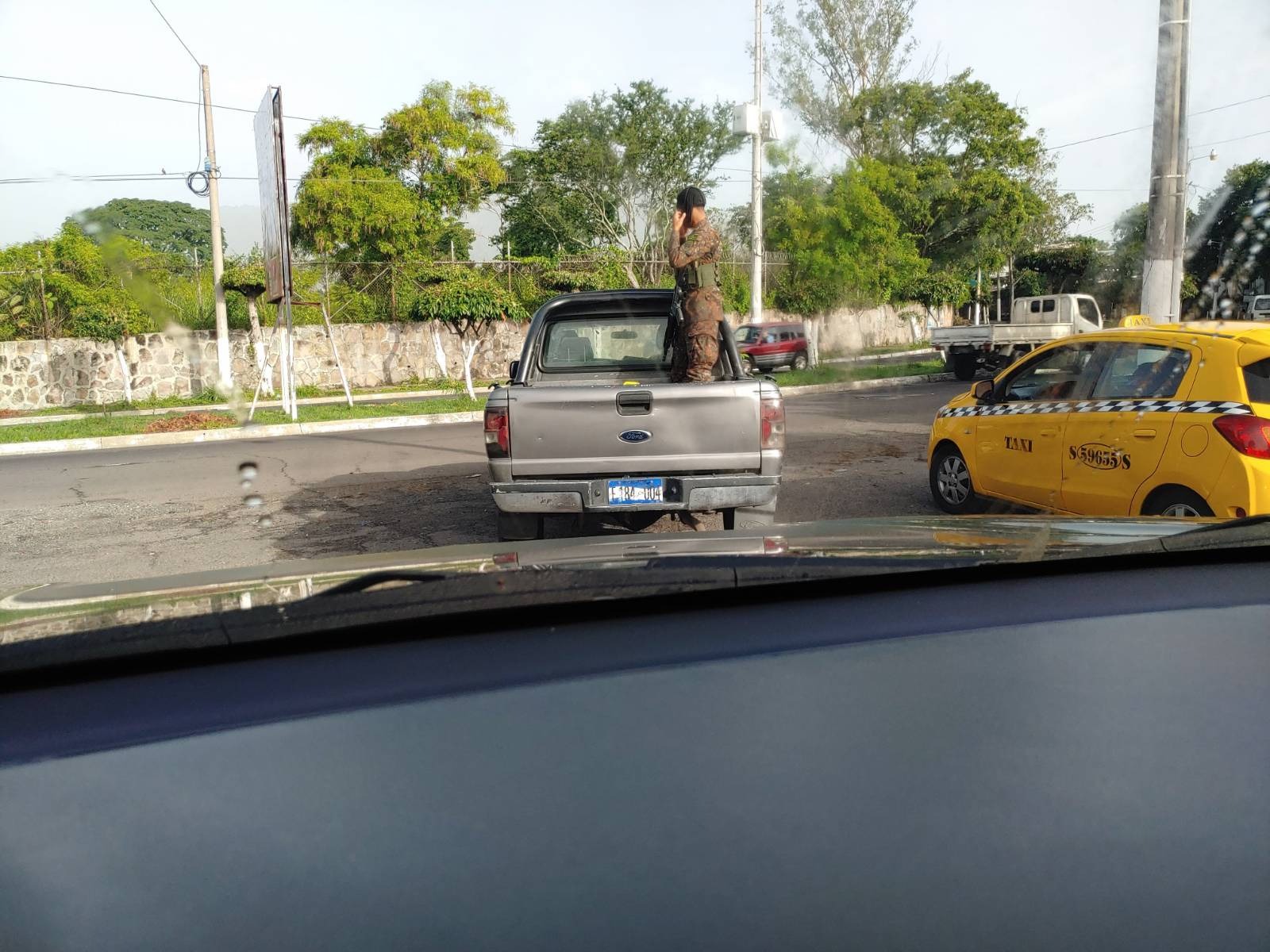
On June 25, 2020, the military vehicle with license plate E184 004 stayed for several hours outside the gate of the neighborhood where former IAIP commissioner Liduvina Escobar lived. The military surveillance coincided with the time when the IAIP was learning about controversial cases involving officials of the current government. Photo: CourteseyPhoto: Courtesy
The former commissioner’s family had to move before leaving the country. They felt at risk. On the day they moved, when the former official’s husband loaded their furniture in a pick-up truck, a man who did not identify himself and who covered his face with a mask and dark glasses asked him where his wife was, where they were moving to and why. Without giving him any explanation, the commissioner’s husband left the place, according to her account.
During her 10 months in exile, her friends have helped her survive. With fundraising activities like selling traditional food and used clothing, the former official was able to pay for her food, personal expenses and her phone bill. She said that she’s grateful because they also lent her a vehicle, but she would prefer to be in El Salvador, practicing her profession. Now she’s waiting for an answer from immigration in order to continue with her life.
“To come to nothing, to live on solidarity. I’d prefer a thousand times over to be in my country, in my house, eating beans with my family, instead of being here. No country, no matter how many good people you meet, will ever be yours, will ever be your land,” she reiterated.
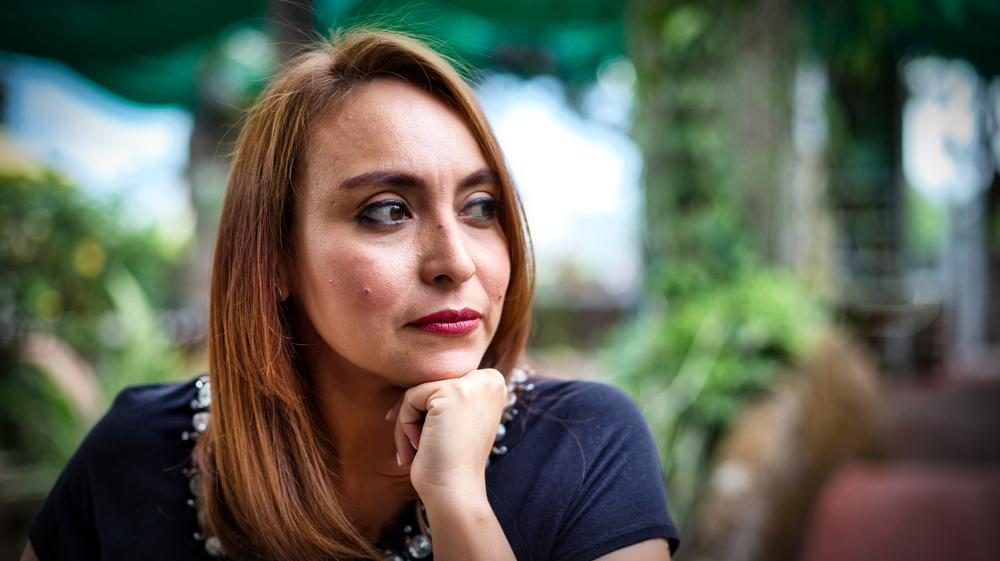
Liduvina Escobar, former commissioner of the Institute for Access to Public Information, had to leave the country after being intimidated and receiving direct threats for ensuring respect for access to public information. Photo archive/ Salvador Meléndez
At the end of 2020, the Bukele government took control of the Institute for Access to Public Information, an institution that had begun to make the government uncomfortable by ordering it to make the use of public resources transparent. The ruling party appointed as commissioners Roxana Soriano, former legislative candidate for the president’s party, and Luis Suarez, now a magistrate of the Constitutional Court. According to Escobar, with the arrival of her new colleagues, the work environment became hostile, even with the institution’s administrative staff.
In the months prior to being removed from her position, Escobar led the fifth sanctioning process against the general director of Penal Centers, Osiris Luna, because he didn’t provide information on the trip he made on a private jet to Mexico in October 2019. The former commissioner also championed the institutional order for the Ministry of Defense to carry out a new search of archives of military operations at the University of El Salvador. Two of the last causes that she led were providing information from the statements of the chief of staff in the Bukele government and Carolina Recinos was included on the Engel list, and the delivery of information on positions and salaries of government employees.
Escobar and her family’s plans are far from El Salvador. She’s thinking about starting a new life in a country where they’re allowed to work and live in peace. “Now, after several months of separation, I’m with my family, enduring in another country. It’s not fair,” said the former commissioner, showing a video of her four-year-old daughter playing in the patio of someone else’s house, on the afternoon of Saturday, March 12, 2022.
******
Lack of trust in state institutions stopped those exiled due to political persecution from filing a complaint in El Salvador, according to the non-governmental organizations that recorded the departures. President Nayib Bukele controls the decisions of the majority of the legislators in the Legislative Assembly, who appointed Supreme Court magistrates and an attorney general in tune with the ruling party. The Constitutional Court, which could curb abuses committed by the executive branch, and the Attorney General’s Office, which could criminally prosecute illicit acts, are aligned with the ruling party. The political persecution intensified after May 1, 2021, when the ruling party took control of the three government branches, according to the case documentation.
Veronica Reyna, human rights programs director at the Passionist Social Service, an organization that has analyzed violence and migration in El Salvador for years, said that although it is true that violence and economic factors continue to cause the majority of migrations, attention should be paid to exiles due to political persecution, although they are not massive enough to represent the third cause of migration.
“This could keep advancing to the extent that certain profiles of the population, who have been designated by the authorities as opponents, but who are critical voices, such as businessmen, political parties, journalists, social organizations and even people who identify a probable risk in exercising their profession, can make the decision to leave the country more often to avoid possible criminalization or aggression towards their integrity or towards their life,” said Reyna.
The Center for Monitoring Attacks on Journalists of the Association of Journalists of El Salvador (APES for the Spanish acronym) documented three cases of journalists who were forced to leave the country after receiving threats, undergoing persecution and surveillance.
“And corruption isn’t new. No power in power likes to have their mistakes pointed out. Politicians want a press that praises them and only attacks their opponents. And when they are found out by journalism, what they do is try to discredit the journalist,” said Susana Peñate, APES trustee.
Other non-governmental organizations shared their records of exiles for political reasons but asked to remain anonymous in this report for their safety and that of those who sought help from them before leaving the country.
A total of 13,404 Salvadorans applied for asylum for different reasons in several countries around the world during the first half of 2021, according to records from the Office of the United Nations High Commissioner for Refugees (UNHCR). The countries that reported the most asylum applications from Salvadorans are the United States and Mexico. In the region, Salvadorans sought asylum in Guatemala and Costa Rica.
Complete data for last year is not yet available in the UNHCR database, so at the moment, a comparison can’t be made to establish whether there is a decrease or increase in requests this year compared to last year. What can be determined with these figures is that in the first two years of Nayib Bukele’s government, 106,104 people applied for asylum in other countries— a figure that reflects that, even with the COVID-19 pandemic involved, Salvadorans continued to leave the country, since a total of 153,563 people sought asylum in foreign countries during the last three years of the Sanchez Ceren government.
II. An activist and former candidate attacked for thinking differently
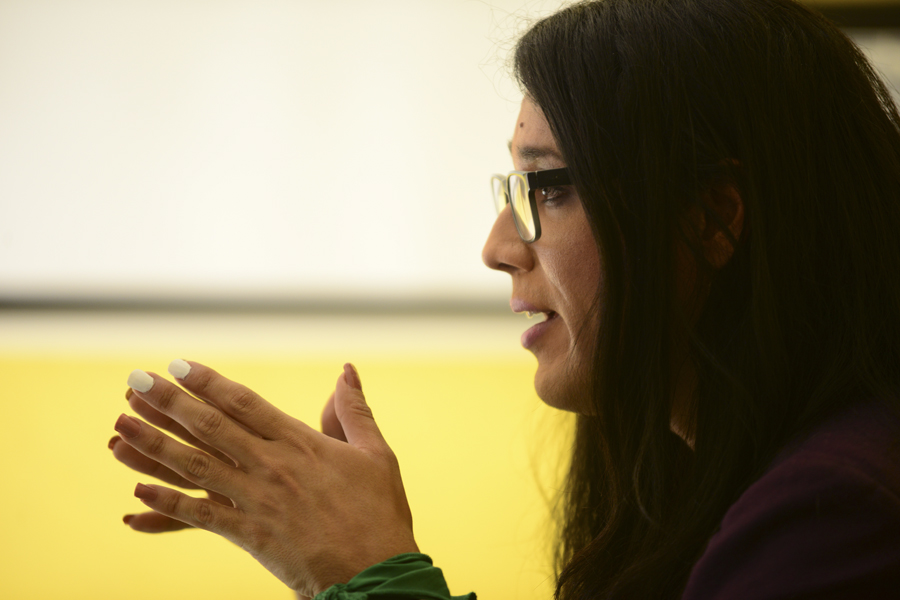
Alejandra Menjívar is the first trans woman who has competed for a deputation in the Central American Parliament. She is a renowned human rights activist. She relates that on May 20, 2021, when she was walking through the San Luis neighborhood in San Salvador, a vehicle stopped in front of her and a group of men got out to intimidate her. File photo/Gerson Nájera
“I’m sure that if I hadn’t left the country, today I’d be a missing person. I’d be dead,” said Salvadoran Alejandra Menjivar, 36, the first trans woman to run for legislator for the Central American Parliament (PARLACEN for the spanish acronym), who spoke with Factum Magazine from Mexico, the country that has granted her permanent residence after she was attacked.
Menjivar has been a human rights defender and an active member of the left-wing FMLN party since 2006. After participating in the last electoral race for mayors, legislators and PARLACEN in February of 2021, she continued to be critical of governmental decisions on her social networks.
On May 20, 2021, while walking through the San Luis neighborhood, north of the San Salvador metropolitan area, a vehicle stopped in front of her and a group of men, who she assumes were gang members, immediately got out to directly threaten her, according to her story. “We’re going to teach you a lesson so you keep quiet,” she remembers being told by a man who pointed a gun at her head and pulled the trigger. The gun jammed and the bullet didn’t harm Menjivar.
The man insisted, nervous, and pulled the trigger a second time, Menjivar recalled. It failed again. The sound of a patrol vehicle passing through the area scared the attackers away and the former candidate snapped out of the trance that she said she went into when she thought she was going to die.
“At that moment, I understood that there was a persecution against me, that the eyes of the government are after the dissenting voices, and that I wasn’t going to run into such luck [of a jammed pistol] two or three times. I decided to leave the country and I did so quickly within a span of 24 hours after what happened to me,” said the activist.
Human rights organizations from Guatemala and Mexico helped her quickly cross the region. The former candidate affirmed that she’s certain enough to affirm that this attack was sponsored by the government, since she believes that they wouldn’t make a direct threat against her by their own decision. “They’re not going to come and tell you ‘you’re going to learn to keep quiet, to not open your mouth.’ The statements and criticisms that I made hours before had been towards the government and I understood that this attack came from them,” she emphasized.
Being a trans woman poses an additional risk in El Salvador. Between 2011 and 2021, 42 trans women were murdered, according to the organization Concavis Trans, which collects data on victims from the LGBTI community. During the political campaign for regional legislator, Menjivar said that she and her family had to leave the place where they lived because they received calls from gang members threatening them for being active members of the FMLN party.
The hate messages focused on her gender identity, she recalled. “Days later, I had to distance myself from my family so as not to put them in danger. It was a risk that I was close to them. Also, I wasn’t able to campaign across the country because the gangs have a presence everywhere,” she added.
In Mexico, she requested refuge for humanitarian reasons at the Mexican Commission for Refugee Assistance (COMAR for the Spanish acronym). Between January and September of 2021, a total of 5,170 Salvadorans requested refuge in Mexico, of which 2,286 obtained the immigration benefit.
In Mexico, she’s also had a hard time. She was reported missing on June 22, 2021 by the organization Refugio Casa Frida (Frida House Refuge). The report was made because they had no news of her and she had last been seen on June 20, 2021 in the Roma neighborhood in Mexico City. She was located and Mexican legislator Lucia Riojas reported in Mexican media that the activist “was raped and she will be treated accordingly.”
******
The United States remains the main destination for Salvadorans fleeing their country. For years, social violence and lack of economic resources were the main reasons for those who decided to leave on a daily basis. Between October 1, 2020 and September 30, 2021, the U.S. fiscal year, 95,930 Salvadorans were detained for crossing the southern border, according to United States Customs and Border Protection (CBP). That figure is the highest reported this century. During the last year, an average of 260 Salvadorans per day were detained, which is almost 8,000 per month.
The numbers of migrants detained at the southern border in 2021 were double those of 2020, the year in which records decreased due to the strict mandatory lockdowns in the countries due to the COVID-19 pandemic. To explain the increase in migrants in the last year and the effect of confinements due to the pandemic in 2020, Oscar Chacon, executive director of Alianza Americas, an organization that works in Latino immigrant communities in the United States, used the analogy of a river blocked by dirtt as an example. By removing the obstacle, the intensity of the flow surges as the liquid continues to flow.
Migration driven by economic, democratic and insecurity problems has always existed, said the migration expert, but people couldn’t leave or move because physical distancing policies were strict.
“In El Salvador, at the present time, we have a configuration where, on the one hand, a clear command of anti-democratic dictatorial tendencies on the part of the current government— which, at least in terms of discourse, is very threatening— and the economic issue converge. We can’t deny that it was affected by the loss of employment and the people who earned their living in the informal economy,” Chacon analyzed.
III. A human rights defender persecuted by the government
Bertha Maria Deleon, a lawyer and human rights defender, left El Salvador six months ago with her six-year-old daughter. “I decided not to return to the country, especially due to the concrete threat of being imprisoned due to absurd criminal accusations, several coming from followers or people close to Nayib Bukele,” she explained in a statement published on March 8, 2022. Now she has the status of protection and permanent residence in a Latin American country.
The silence that she had maintained since leaving El Salvador was broken on social networks a day after the Attorney General’s Office reported that it had filed an accusation against her before the Peace Court of Antiguo Cuscatlán, in La Libertad, for “child abuse and deprivation of liberty.” This criminal process is developing while she is out of the country. While in exile, the lawyer accuses the father of her children, from whom she has been separated since August of 2019, of being responsible for using Salvadoran institutions “for his purposes” because she says that he knows where he can visit his daughter and has also spoken with her.
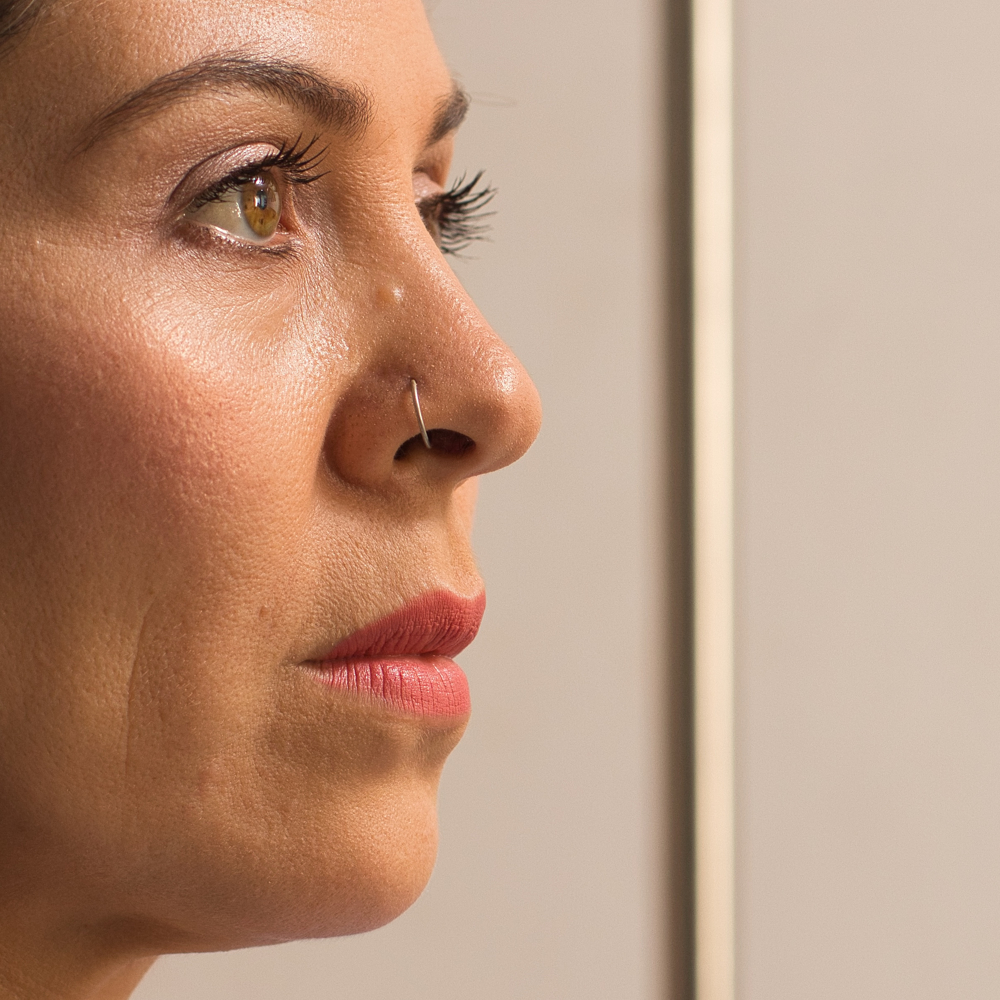
Interview with lawyer Bertha María Deleón, candidate for deputy for the new party “Nuestra Tiempo”, with a view to the elections of Deputies and Mayors of 2021, in La Libertad, El Salvador, on July 18, 2020.
Photo FACTUM/ Salvador Meléndez
Deleon was the first Salvadoran human rights defender to receive precautionary measures in her favor from the Inter-American Commission on Human Rights (IACHR), during the administration of President Bukele. On September 19, 2021, the Commission, the body responsible for promoting and protecting human rights on the continent, asked El Salvador to “adopt the necessary measures to protect Deleon’s rights to life and personal integrity.” The main objective was for the lawyer to be able to work without being threatened, intimidated or subjected to violence.
She was a legislative candidate for the Nuestro Tiempo (Our Time) party in the 2021 elections. She was also a lawyer for the former IAIP commissioner, Liduvina Escobar, whom she accompanied during the presentation of a constitutional protection lawsuit in the Constitutional Court. Her risk increased in 2020, as documented by the IACHR, when she adopted a critical voice against the Bukele government and stopped Walter Araujo’s candidacy for legislator after denouncing him for directing cyber attacks against her, which triggered threats of murder and rape. One day after the Constitutional Court and the prosecutor’s office were disbanded, on May 2, 2021, Araujo announced that he would sue the lawyer for revealing details of a judicial process classified as confidential.
“Migration isn’t a crime, seeking a life free of violence, a decent life, to continue raising my children and working is what I want,” said Deleon.
This work is part of the special The New Paths of Central American Migration. The following media outlets are part of Otras Miradas: Divergentes, Revista Factum, Contracorriente, Agencia Ocote y La Voz de Guanacaste. It was supported by the Canada Fund for Local Initiatives.





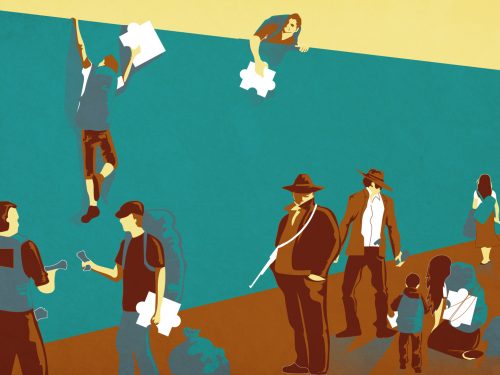
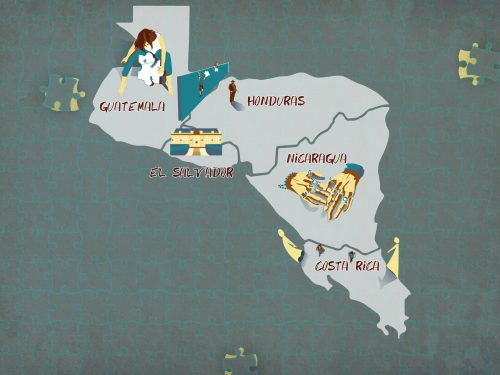

Comments